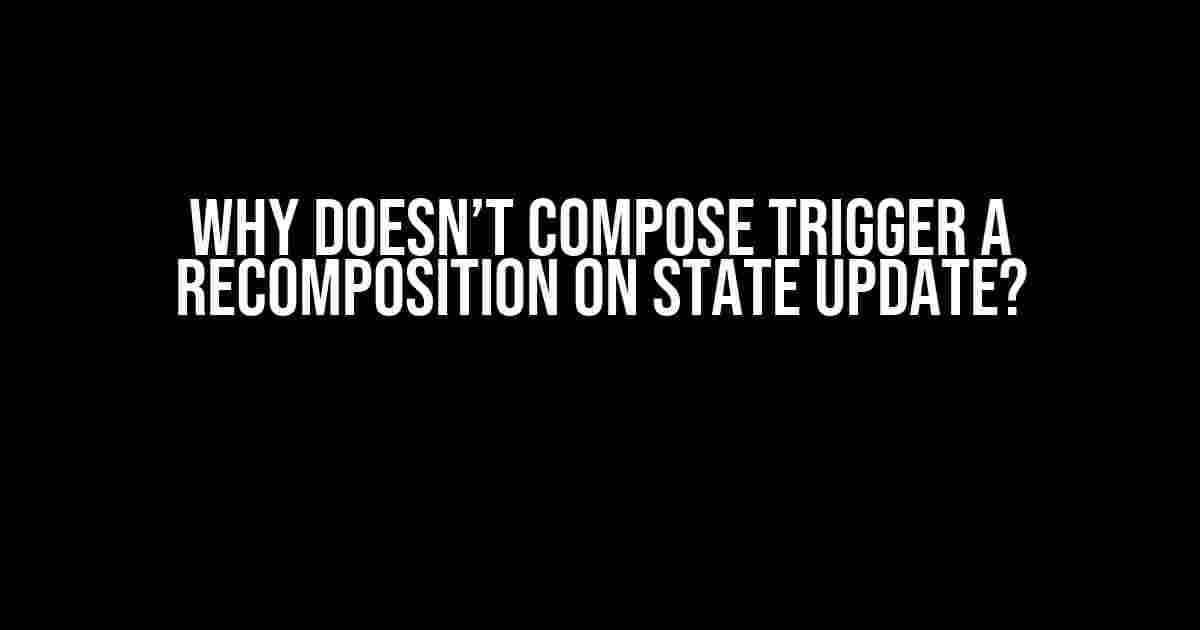Are you stuck in a rut, wondering why your Compose UI isn’t updating when your state changes? You’re not alone! This is a common conundrum that many developers face when working with Jetpack Compose. In this article, we’ll dive deep into the reasons behind this behavior and provide you with practical solutions to get your UI recomposing on state updates.
Understanding Compose and Recomposition
Before we dive into the why, let’s quickly recap what Compose and recomposition are.
- Compose: Jetpack Compose is a modern, declarative UI framework for Android. It allows you to create UI components in a declarative way, using a programming language like Kotlin.
- Recomposition: Recomposition is the process of rebuilding your UI component tree when the underlying data changes. This ensures that your UI always reflects the latest state.
How Compose Triggers Recomposition
Compose uses a concept called “invalidation” to trigger recomposition. When the state of your app changes, Compose invalidates the affected UI components, which triggers a recomposition. This process is efficient and optimized, so you don’t need to worry about unnecessary recompositions.
@Composable
fun MyUI(state: MyState) {
// Compose will recompose this UI when state changes
Text("Current state: ${state.value}")
}
The Problem: State Update Without Recomposition
So, why doesn’t Compose trigger a recomposition on state update? There are several reasons for this behavior:
- Immutable State: In Compose, state is immutable by design. When you update your state, you’re creating a new instance, rather than modifying the existing one. This means that Compose doesn’t detect the change and therefore doesn’t trigger a recomposition.
- Scope and Context: Compose uses a concept called “scope” to determine when to recompose. If your state update is not within the scope of the composable function, Compose won’t trigger a recomposition.
- Lazy Initialization: When you use lazy initialization for your state, Compose might not detect the change, leading to no recomposition.
Solution 1: Use MutableState
One way to trigger a recomposition on state update is to use `MutableState
val state = mutableStateOf(MyState())
@Composable
fun MyUI() {
// Compose will recompose this UI when state.value changes
Text("Current state: ${state.value}")
}
Solution 2: Use a ViewModel and LiveData
An alternative approach is to use a ViewModel and LiveData to manage your state. This way, you can observe the state changes and trigger a recomposition.
class MyViewModel : ViewModel() {
private val _state = MutableLiveData(MyState())
val state: LiveData = _state
fun updateState(newState: MyState) {
_state.value = newState
}
}
@Composable
fun MyUI(viewModel: MyViewModel = viewModel()) {
val state by viewModel.state.observeAsState()
// Compose will recompose this UI when state changes
Text("Current state: ${state.value}")
}
Solution 3: Use a State Holder and SnapshotStateList
Another solution is to use a State Holder and SnapshotStateList to manage your state. This allows you to create a snapshot of your state, which Compose can observe.
class MyStateHolder {
val state = SnapshotStateList<MyState>()
}
@Composable
fun MyUI(stateHolder: MyStateHolder = remember { MyStateHolder() }) {
val state by stateHolder.state.observeAsState()
// Compose will recompose this UI when state changes
Text("Current state: ${state.value}")
}
Best Practices for State Management
To avoid issues with state updates and recomposition, follow these best practices:
- Use Immutable State: Use immutable state objects to ensure that your state is predictable and easier to manage.
- Use a Single Source of Truth: Use a single source of truth for your state, such as a ViewModel or a State Holder.
- Observe State Changes: Use observers or LiveData to observe state changes and trigger recompositions.
- Minimize Side Effects: Minimize side effects in your composable functions to ensure that they’re predictable and easy to reason about.
Conclusion
In this article, we’ve explored the reasons why Compose might not trigger a recomposition on state update. We’ve also discussed three solutions to this problem: using `MutableState
| Solution | Description |
|---|---|
| MutableState<T> | Create a mutable reference to your state, allowing Compose to observe changes. |
| ViewModel and LiveData | Use a ViewModel and LiveData to manage your state and observe changes. |
| State Holder and SnapshotStateList | Create a snapshot of your state, allowing Compose to observe changes. |
By understanding the underlying mechanisms of Compose and following these solutions and best practices, you’ll be well on your way to creating robust and efficient UI components that always reflect the latest state.
Frequently Asked Question
Get answers to your most pressing questions about why Compose doesn’t trigger a recomposition on state update!
Why doesn’t Compose trigger a recomposition when I update my state object?
Compose won’t trigger a recomposition if the state object itself doesn’t change, even if the properties inside it do. Think of it like a fancy wrapper around your data – if the wrapper stays the same, Compose won’t bother re-rendering. To fix this, try using a new instance of your state object or using a data structure that Compose can detect changes to, like a List or a LiveData.
But I’m using a LiveData, and Compose still doesn’t recompose when the data changes!
Check if you’re using `observeAsState` correctly! If you’re not using the `value` property of the LiveData, Compose won’t know when the data changes. Try using `observeAsState` with the `value` property, like this: `val myData by myLiveData.observeAsState.nullable()`.
What if I’m using a custom data class as my state object, and Compose doesn’t detect changes to its properties?
Make sure your custom data class overrides the `equals` and `hashCode` methods! Compose uses these methods to detect changes to the state object. If your custom class doesn’t override these methods, Compose will think the state object is the same even if its properties change.
I’m using a Flow to update my state, but Compose doesn’t recompose when the Flow emits new data!
Did you remember to call `collectAsState` on your Flow? If not, Compose won’t know when the Flow emits new data. Try using `collectAsState` to convert the Flow into a Stateixe value that Compose can observe.
I’ve checked all of the above, and Compose still doesn’t recompose when my state updates. What’s going on?
Time to break out the debugging tools! Use the Compose debugger or the Android Studio debugger to see what’s going on when your state updates. Check if the state is actually updating, and if Compose is getting notified about the change. If you’re still stuck, try asking for help on the Compose community forums or Stack Overflow!


